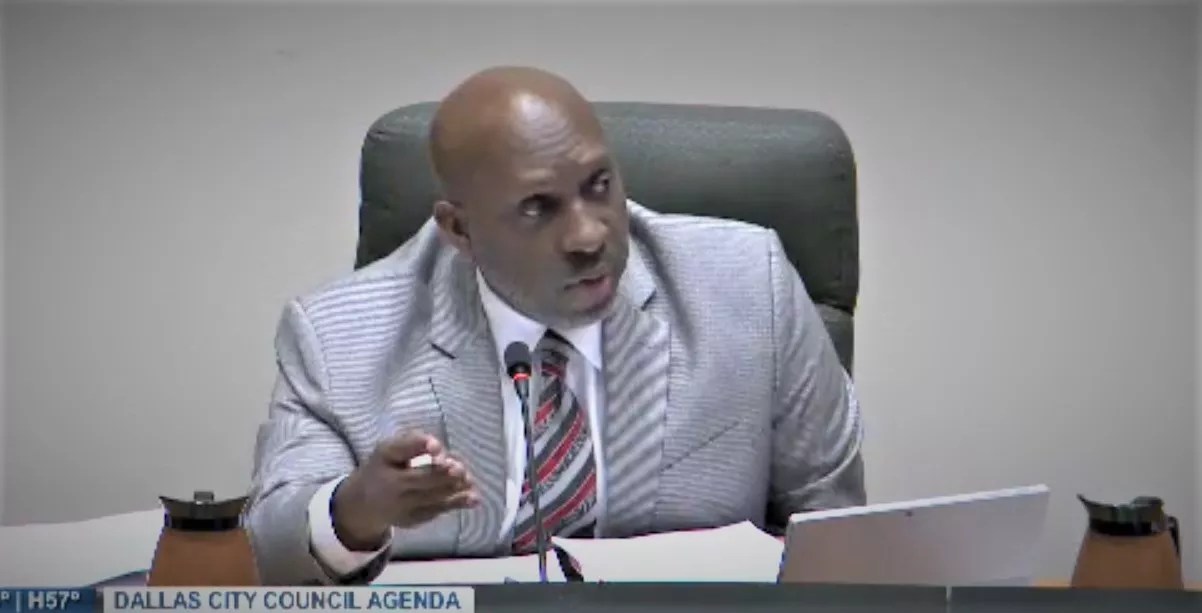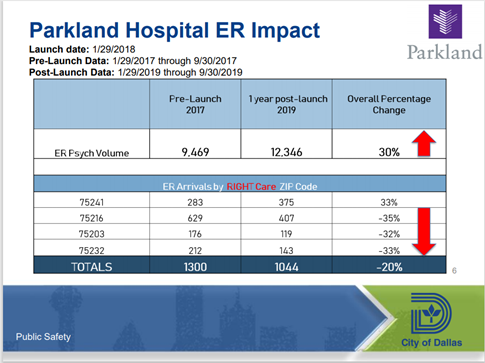
dallascityhall.com

Audio By Carbonatix
After George Floyd was murdered by Minneapolis Police officer Derek Chauvin last year, police departments across the U.S. scrambled to implement reforms: moves to hold police accountable, programs to sharpen incoming officers’ training and rules barring restraints like chokeholds, for instance.
Dallas joined the wave only 10 days after Floyd’s murder. On June 4 last year, City Manager T.C. Broadnax issued a memo announcing an 11-point police reform plan, saying that “recent events have brought international attention to the difficult relationships between law enforcement and communities of color. The opportunity to restore the public’s trust is here and now.”
Broadnax’s proposed reform initiative included an upgraded ban on chokeholds, new body-camera transparency measures, a monthly public report detailing Dallas PD’s traffic stops and an expansion of the city’s mental health crisis response program, RIGHT Care.
The Rapid Integrated Group Healthcare Team Care, or RIGHT Care, is a mental health crisis response program designed to keep people in the throes of an acute mental health crisis from being tossed in jail or catching criminal charges that land them in lockup.
RIGHT Care operates between 7 a.m. and 11 p.m. daily. During this time, a social worker from the Parkland Health and Hospital System stationed in Dallas’ 911 call center screens all incoming calls for signs of a possible mental health crisis occurring on the other end.
“They are able to see and monitor all the calls that are in progress at the station,” said Tabitha Castillo, RIGHT Care’s program manager with the city of Dallas’ Office of Integrated Public Safety Solutions.
If the Parkland social worker determines that an urgent mental health crisis is happening on the other end of a 911 call, they can dispatch a RIGHT Care team – consisting of a paramedic from Dallas Fire and Rescue, a DPD officer and another Parkland social worker.
Upon arrival, Castillo explained, “our protocol is that the officer first gets out, touches base with the caller, and makes sure the scene is safe for the team, and that the actual person calling is safe.”
Castillo said, “One thing you should know though is that the response of the field team is led by the social worker.”
On Saturday, Broadnax proposed a new city budget for the coming fiscal year that included a $2 million boost for RIGHT Care. The additional funds, Castillo said, will equip the city to gradually expand RIGHT Care services. Eventually, five more teams will be added to the existing five already operating.
RIGHT Care’s expansion is a policy centerpiece in Broadnax’s new budget, leading the list of public safety initiatives highlighted in the budget. DPD is slotted to receive at least $53 million more than last year, raising its budget to around $567 million, the largest in the city by a longshot.
RIGHT Care’s proponents – the city, DPD and the Parkland Health and Hospital System – pin the program’s effectiveness on a key stat: In the two years after a pilot version of the program was launched in South Central Dallas in 2018, the number of admissions to Parkland’s psychiatric hospital facilities from the area declined by 20% overall.

A slide documenting the data touted by officials as evidence of the RIGHT Care pilot program’s efficacy.
The Dallas Observer
In the three years since the pilot launched, the rate of admissions into Parkland’s psychiatric hospital facilities declined by slightly more than 30% within three of the four ZIP codes included in the program, according to data presented in a city of Dallas PowerPoint presentation.
But overall, Parkland Hospital and Health Systems saw a 30% increase in psychiatric admissions during the same period citywide.
The slide doesn’t include data about the number of Parkland psychiatric hospitalizations in 2018. “It’s an odd way to present the statistic, because it could be other interventions, other mental health services accounting for the 20 percent reduction,” said Ira Burnim, legal director for the Bazelon Center on Mental Health Law.
Burnim also noted that the data provided “does not account for whether that person was eventually brought to the ER, or to another psych facility.”
Broadnax’s budget document says that “in February and March 2021, we expanded the RIGHT Care program from one team to five teams covering the entire city from 7:00 a.m. to 11:00 p.m.”
The addition of four additional teams drastically expanded the program’s response capacity, according to the budget. “Prior to expansion, we averaged 98 RIGHT Care responses per month,” the document notes. “However, following expansion earlier this year, we currently average 748 RIGHT Care responses per month.”
By these numbers, RIGHT Care responded to 1,176 calls per year on average when it only consisted of a single team; adding four more teams to cover the entire city increased RIGHT Care’s annual call capacity to 8,976 per year.
If Broadnax’s proposed budget is approved in September, RIGHT Care will gain another five units, for a total of 10 operational teams. According to his proposed budget, this increase will enable RIGHT Care to respond to about 13,000 mental health emergency calls annually, and “eventually, ideally,” provide coverage overnight, Castillo said.